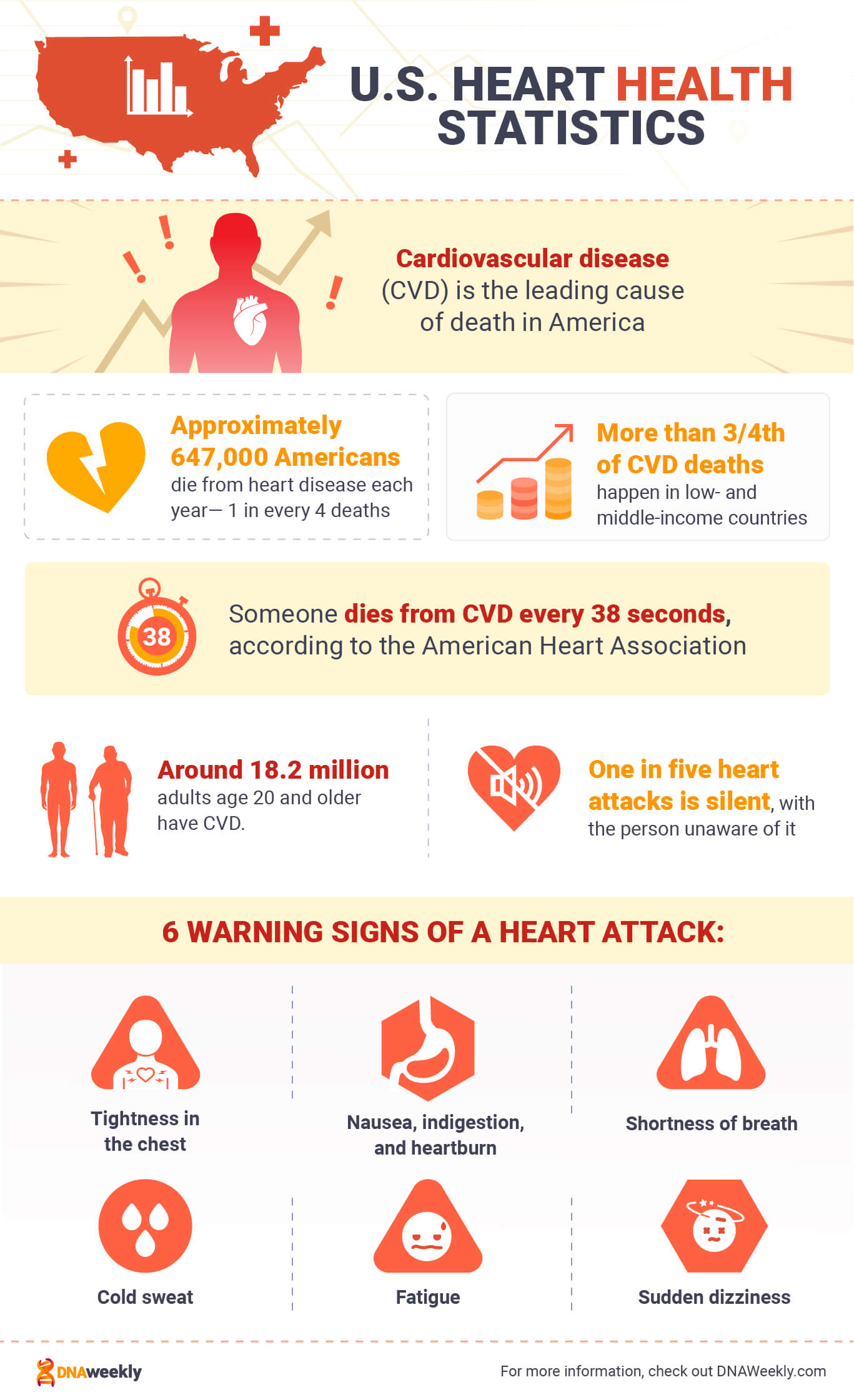
Every February marks the annual American Heart Month in the United States. Put simply, this month raises awareness about heart disease and helps people learn ways that they can protect their heart health. The federally designated event stands as a reminder to all when it comes to this important issue. Here’s everything you need to know.
What Is American Heart Month?
After a request from Congress, President Lyndon B. Johnson proclaimed the first American heart health month in February 1964. It has been celebrated in the USA every year since. Fundraising and heart health awareness events take place all over the country during February. For example, this year, the National Heart, Lung, and Blood Institute (NHLBI) and The Heart Truth® are partnering to run the #OurHearts movements throughout the month. You can get involved with the campaign by using this hashtag on Twitter and Facebook. The #OurHearts campaign is broken down into weekly themes, as follows:
Week One: Be Physically Active
At the start of the February heart month, the campaign encourages people to get together to be more physically active. You could organize a group walking session, take a new gym class, or even get a team together for a sporting event. Decide how you want to get active!
Week Two: Eat Healthier
Eating well is a smart way to protect your heart’s health. During the second week of the campaign, those taking part are encouraged to learn more about heart-healthy foods. Cooking balanced meals at home and even inviting friends over for dinner is the key.
Week Three: Track Your Heart Health Stats
During week three of American Heart Month, those taking part in the #OurHearts campaign will track their health stats. Check your blood pressure, and use your smartphone or a wearable tracker to see how well your heart is performing.
Week Four: Manage Stress, Sleep Better, and Quit Smoking
The final week of the campaign combines all of the ways in which you can protect your heart. Better sleep, less stress, and quitting smoking are smart places to start. Don’t forget to share your results on social media.
Why Does American Heart Month Matter?
One in four deaths in the USA is caused by heart disease, so this is a critical national issue. However, recent research suggests that many people lack education about cardiovascular conditions and their warning signs. American Heart Month aims to address the lack of awareness by getting us all thinking about the small ways in which we can keep our hearts healthy. Because heart disease in America is so far-reaching, many Americans raise funds for heart-related organizations through charitable activities, events, and campaigns. You can help by donating to organizations, including the American Heart Association, WomenHeart: The National Coalition for Women with Heart Disease, and the World Institute on Disability.
Important Heart Failure Statistics

Major Risk Factors for Heart Disease
Many different risk factors affect your chances of developing heart disease. Understanding what aspects of your life play a role can help you make changes to improve your health. Of course, there are some risk factors that you cannot change, but you should still be aware of them. Here are the risk factors that the American Heart Association identifies for this condition:
- Advanced Age: Your risk of developing and dying from a heart-related illness increases as you age, with most deaths occurring in the over 65 age group, so staying as healthy as possible through exercise and diet is the best way forward.
- Gender: Men are more at risk of having a heart attack than women, and having one earlier, too. So, men should be particularly cautious when it comes to heart health.
- Heredity Risk: You have a higher chance of developing heart disease if other family members have it. You may want to get your DNA tested for any hereditary risk, then (of course) discuss the results with your doctor.
- Smoking: As well as negatively impacting your everyday health, the American Heart Association notes that smokers are more likely than non-smokers to develop heart disease. If you smoke, now’s the time to kick the habit!
- Low Physical Activity: Leading a sedentary lifestyle is one of the major risk factors for developing coronary heart disease, but you don’t have to be an elite athlete to increase your activity levels as extra protection.
- Being Overweight: Overweight people are more likely to develop heart disease. Excess body fat around the stomach and abdomen areas is particularly dangerous, and can also lead to high blood pressure.
- Stress: Your physiological response to stress could be a leading risk factor for having a heart attack. Look for healthy ways to deal with the stress of your everyday commitments, such as mindfulness and meditation.
- Alcohol: Drinking alcohol excessively can raise your blood pressure, which is a real risk for heart-related illnesses. If you think you have a problem with alcohol, get help from a medical professional.
- Poor Diet: What you eat affects your health. Eating nutrient-rich foods (such as fruits and vegetables) and limiting your red meat and sugar consumption is a good place to start.
How to Check for Heart Disease
Since heart disease and heart failure are so common in America, it’s vital to know how to check for these illnesses by looking out for the warning signs, checking your genetic predisposition, and getting regular medical checkups. Let’s look at each of these.
Look Out for the Warning Signs
Keeping track of your day-to-day health is essential. Although these symptoms don’t necessarily mean that you have a heart problem, the American Heart Association encourages you to look out for the following:
- Shortness of Breath: Do you experience shortness of breath when active or even while resting? These symptoms could indicate that your body isn’t getting the oxygen it needs due to heart-related issues.
- General Tiredness: Do you find it hard to complete simple daily activities? Always feeling tired or fatigued – even when just waking up – could be symptomatic of a larger underlying health concern such as your heart failing to pump enough blood around your body.
- Sickness or Lack of Appetite: You might feel full or even sick when your heart is failing to pump blood around the body, because your digestive organs can’t function properly when they’re not getting enough blood.
- Confusion: Even confused and impaired thinking could be indicative of heart problems. This is because levels of substances in your blood (such as sodium) are affecting your brain.
- Coughing or Wheezing: If you’re always wheezing or coughing up white or pink blood-tinged mucus, you should contact your doctor as soon as possible. This could be a sign of fluid build-up in the lungs related to heart failure.
- Fast Heart Rate: Unless there is a clear cause – such as running to catch a bus – an elevated heart rate is a worrying sign. So are heart palpitations. If you experience these symptoms, speak to a doctor soon!
Check for a Genetic Predisposition
While heart disease and other heart-related conditions can be triggered or made worse by lifestyle factors, some people are more at risk than others due to their unique genetics. It’s easy to discover if you’re genetically predisposed to heart conditions by ordering a DNA test kit. When your kit arrives, simply spit into a test tube, take a cheek swab, or (rarely) submit a blood sample from the tip of your finger. You’ll get your results online within a few weeks. Some of the most popular and trusted DNA test kit providers are as follows:
Futura Genetics: The Futura Genetics DNA kit is designed to test 28 of the world’s most common health conditions worldwide, including the risk level for coronary heart disease (CHD). People with CHD have narrowed arteries as a result of fatty substances in the blood.
EasyDNA: The all-in-one health testing package from EasyDNA analyses around 700,000 genetic markers for 200 of today’s most common diseases. The report gives you a breakdown of your genetic health risk for coronary heart disease (CHD) and a variety of other conditions.
23andMe: This popular DNA testing service reports on several genetic factors that impact heart health. You’ll learn about your risk for coronary heart disease, atrial fibrillation, and a rare heart condition called hypertrophic cardiomyopathy. It also reports on how your genes could affect your response to anti-clotting drugs to reduce the risk of a heart attack.
Helix: The Helix DNA kit tests for predisposition to familial hypercholesterolemia (FH), a condition that can significantly increase your coronary artery disease risk. The test also checks if you are a carrier for certain genetic conditions, so you can protect your family even if you’re not at risk yourself.
Color: Color DNA helps you learn about your chances of developing inherited heart conditions such as cardiomyopathy, arrhythmia, arteriopathy, and familial hypercholesterolemia. Understanding your chances of developing these diseases can help you protect yourself by making changes to your lifestyle.
Pathway Genomics: The Cardiac DNA Insight test from Pathway Genomics will reveal your risk of various heart-related health conditions, including hypertension, heart disease, familial hypercholesterolemia, and venous thrombosis. You’ll also learn the clinical implications of any of these conditions.
Invitae: Genetic testing only looks at your predispositions to diseases, not whether you actually have those diseases. That said, Invitae’s website claims that its genetic tests can:
- provide a medical diagnosis for unexplained symptoms
- confirm a suspected disease
- help identify new or better treatment options
- confirm eligibility for clinical trials
- identify family members who may also be at risk
Get Regular Medical Checkups
DNA testing can tell you if you’re genetically predisposed to certain heart-related health conditions (so you can adapt your lifestyle) or if you’re a carrier (so you can encourage the rest of your family to get tested). However, DNA tests don’t tell you if you actually have heart disease. Only your doctor can do this, so you should always discuss your genetic predispositions with him or her. And be sure to accept your primary care provider’s invitations to get regular heart checkups and screenings. This could save your life, or at least make it more comfortable.
The Takeaway
The #OurHearts campaign is just one example of a health awareness month taking place in 2020. There are many other ways to get involved and help raise awareness during American Heart Month. Of course, you don’t have to wait until February every year, and you don’t have to be American to learn more about the devastating effects of poor heart health. Get tested today, and start making the necessary changes that could prolong your life and make it more comfortable.
More Resources
Here are some useful resources that will help you find out more about how to protect your heart and lower your risk of health issues:
- The American Heart Association: https://www.heart.org
- World Health Organization (WHO): https://www.who.int/health-topics/cardiovascular-diseases
- The Heart Foundation: https://theheartfoundation.org

